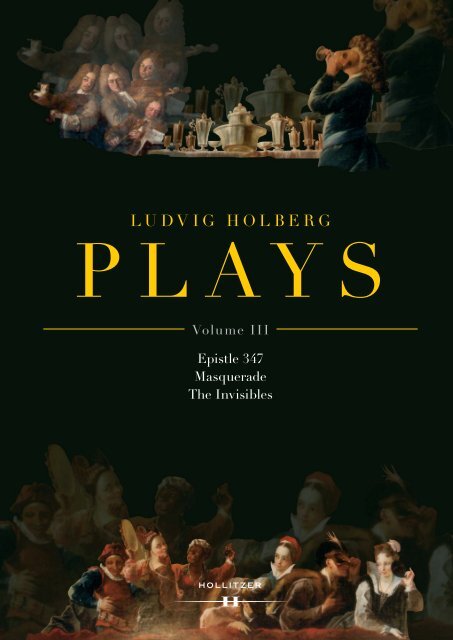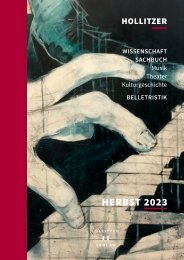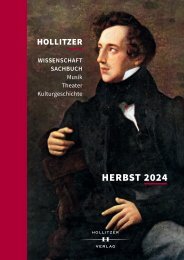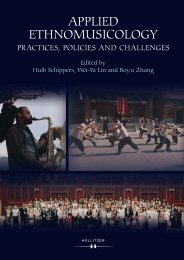Create successful ePaper yourself
Turn your PDF publications into a flip-book with our unique Google optimized e-Paper software.
LUDVIG HOLBERG<br />
PLAYS<br />
<strong>Vol</strong>ume <strong>III</strong><br />
Epistle 347<br />
Masquerade<br />
The Invisibles<br />
I
LUDVIG HOLBERG<br />
PLAYS<br />
VOLUME <strong>III</strong>
LUDVIG HOLBERG<br />
PLAYS<br />
VOLUME <strong>III</strong><br />
EPISTLE 347<br />
MASQUERADE<br />
THE INVISIBLES<br />
Edited and translated from the Danish by<br />
Bent Holm and Gaye Kynoch
The translation project is grateful for funding from:<br />
Danish Arts Foundation<br />
Frontcover image, details from:<br />
Benoit Le Coffre, A Masquerade, Frederiksberg Palace, Denmark, 1704<br />
Ludvig <strong>Holberg</strong>: <strong>Plays</strong>, <strong>Vol</strong>ume <strong>III</strong><br />
Epistle 347; Masquerade; The Invisibles<br />
Edited and translated from the Danish by Bent Holm and Gaye Kynoch<br />
Vienna: HOLLITZER VERLAG, 2023<br />
Epistle 347 (Epistel 347), Masquerade (Maskerade), and The Invisibles (De Usynlige)<br />
have been translated from the Danish versions published by Ludvig <strong>Holberg</strong>s Skrifter<br />
(The Writings of Ludvig <strong>Holberg</strong>) at:<br />
Ludvig <strong>Holberg</strong>s Skrifter http://holbergsskrifter.dk<br />
Cover and Layout: Nikola Stevanović<br />
Printed and bound in the EU<br />
All rights reserved.<br />
Except for the quotation of short passages for the purposes of criticism and review, no part of<br />
this publication may be reproduced, stored in a retrieval system, or transmitted, in any form by<br />
any means, digital, electronic or mechanical, or by photocopying, recording, or otherwise, or<br />
conveyed via the Internet or a Web site without prior written permission of the publisher.<br />
Responsibility for the content and for questions of copyright lies with the editors.<br />
Performance rights: All rights whatsoever in this play are strictly reserved and application for<br />
performance rights of any nature should be made before rehearsals to Hollitzer Verlag.<br />
No performance may be given unless a licence has been obtained.<br />
www.hollitzer.at<br />
ISBN 978-3-99094-170-6
CONTENTS<br />
7<br />
PREFACE<br />
15<br />
INTRODUCTION<br />
Epistle 347<br />
(Epistel 347)<br />
17<br />
EPISTLE 347<br />
1749<br />
21<br />
INTRODUCTION<br />
Masquerade<br />
(Maskerade)<br />
23<br />
MASQUERADE<br />
1723/24<br />
97<br />
INTRODUCTION<br />
The Invisibles<br />
(De Usynlige)<br />
99<br />
THE INVISIBLES<br />
1726<br />
5
6
PREFACE<br />
<strong>Holberg</strong> and masks<br />
<strong>Holberg</strong> saw the world, human existence, as a stage upon which the actors, humankind,<br />
appear clad in a character trope, a mask, a manifestation of the surrounding<br />
cultural reality – but not necessarily a manifestation of any deeper truth about<br />
humankind or about the world; each individual comprises numerous identities,<br />
interpreted in a multitude of ways via the multitude of responding individuals in<br />
any given situation. In this theatrum mundi – the theatre of life – it is important to<br />
act professionally: not taking the rules of the ‘societal game’ at face value while<br />
being able to fake it convincingly, as and when necessary. Ultimately, this view<br />
of human existence implies striking a balance between substance and appearance.<br />
What is what? When is the mask an augmentation and when is it an empty shell?<br />
As <strong>Holberg</strong> wrote in one of his philosophical essays: “Most people are masked<br />
and, like performers, clad themselves as different figures for as long as the performance<br />
lasts. Only when the role has been played, and the mask removed, do we<br />
know whether it has been feigned or genuine.” 1 The unmasking – be it the finale<br />
of a play or the finale of a life – is therefore a philosophical and creative moment<br />
of truth.<br />
Given that illusion and roleplay are such stuffs as theatre is made on, the stage<br />
is <strong>Holberg</strong>’s perfect instrument upon which to act out the existential themes.<br />
When religious influences caused theatre to be, in practice, banned in Denmark<br />
for two whole decades (see Ludvig <strong>Holberg</strong>: <strong>Plays</strong>, <strong>Vol</strong>ume I, pp. 11–15), opening<br />
again in 1747, he turned particularly to the medium of philosophical essay, often<br />
with stage performance or masquerade entertainment as metaphorical backdrop<br />
to these philosophical thoughts. A dialogue thus emerges between his plays and<br />
his moral reflections; they elaborate, clarify and modify one another.<br />
The first two volumes in the present series of new English-language translations<br />
highlight the roles of, respectively, theatre and women, in which <strong>Holberg</strong><br />
challenges and subverts fixed notions and patterns of response. It could be said<br />
that he unmasks the sightlines and reveals how views of class and gender, for<br />
example, are more a matter of conventions and social structures than of actual<br />
matter.<br />
For this volume, we have chosen to present <strong>Holberg</strong>’s constantly underlying<br />
mask theme via three pieces written in various styles and forms, crisscrossing<br />
one another while drawing the major points into the individual scenarios and the<br />
1 Ludvig <strong>Holberg</strong>: Moralske Tanker (‘Moral Reflections’), Libr. I, Epigr. 117, Copenhagen 1744,<br />
p. 184.<br />
7
overall picture. In these three pieces, <strong>Holberg</strong> has pinpointed vital elements of<br />
la comédie humaine, the human comedy, the complexity of human civilisation and<br />
human endeavours.<br />
To <strong>Holberg</strong>, the mask was both an instrument of performance and a metaphor.<br />
It is no surprise that the first experience of theatre to make an impression on him,<br />
according to his own words, was the Italian commedia dell’arte, which he encountered<br />
during carnival in Rome, where he stayed 1715–1716. In 1722, a new theatre<br />
opened in Copenhagen; for the first time, plays were performed professionally in<br />
Danish, the main focus being on satirical depictions of contemporaneous realities.<br />
An underlying inspiration, however, was generated by the ironic commedia dell’arte<br />
gaze upon the world. Masks were indeed a central component in another activity<br />
at the theatre, and a source of its income: the public masquerades. When these too<br />
were subject to an official ban, <strong>Holberg</strong> saw his opportunity to present a whole<br />
slew of arguments in defence of the masquerade; arguments that essentially address<br />
the relationship between nature and culture.<br />
When the new theatre had opened, disapproved of by theological and academic<br />
authorities, <strong>Holberg</strong> had argued (under the guise of a man named Just Justesen,<br />
in his Reflections on Theatre; see Ludvig <strong>Holberg</strong>: <strong>Plays</strong>, <strong>Vol</strong>ume I, pp. 11–21) that<br />
it was not the thing-in-itself – in casu the theatre – but the thing-as-seen that<br />
determined whether it was offensive or acceptable. If the clergy and the authorities<br />
were cheerfully frequent attendees of the theatre – as was the case in other countries<br />
– well then, theatre would magically cease to symbolise all things shady and<br />
offensive. In the wider perspective, it could be said that theatre actually exposes<br />
the theatricality of everyday and public life. <strong>Holberg</strong>’s argument suggested that<br />
the masquerade served a higher purpose by unmasking the roleplay and playacting<br />
in the private sphere and in the societal arena.<br />
The twofold masquerade<br />
In the play Masquerade (1723/24; Maskerade), moderately-minded Mr Leonard<br />
speaks in defence of this vilified form of entertainment when he refers to the “natural<br />
equality” between people that can be acted out in the forum of the masquerade.<br />
<strong>Holberg</strong> here references nature as the ultimate yardstick – as is also the case with<br />
equality between men and women (see Ludvig <strong>Holberg</strong>: <strong>Plays</strong>, <strong>Vol</strong>ume II, pp. 9–17).<br />
In ‘Epistle 347’ (1749; ‘Epistel 347’), he reiterates that we are dealing with the<br />
original “human state” of equality between people, but adds an extra layer by<br />
qualifying this as: “to which humankind was assigned by God at first creation,<br />
and from which through sin is fallen”. God and nature are the ultimate heavyweights<br />
when ‘the natural state’ is being written into a biblical frame narrative –<br />
perhaps in this instance with due consideration to the pietistic situation prevailing<br />
8
in Denmark at the time. But he goes even further by putting the issue of equality<br />
into a history of civilisation context, turning the relationship between reality and<br />
masquerade upside down. Because now, paradoxically, it turns out that what we<br />
believe to be reality is in reality a masquerade, while the masquerade is more real<br />
than reality since it unmasks the masquerade of reality! Civilisation is in effect<br />
a Fall from the original, natural state, an arena in which a ‘philosophical game’<br />
displays – or unmasks – the irrationality of the cultural playacting. The mask liberates<br />
the individual from the process of masking imposed by the conventions of<br />
everyday life. This unmasking via masking corresponds, as mentioned, to theatre<br />
exposing the theatricality of its surrounding culture.<br />
In ‘Epistle 347’, <strong>Holberg</strong> sums up this idea: “the conventional human state in<br />
which we live is a constant masquerade, since social order, conventions and customs<br />
impose masks upon us, which in this kind of amusement we lay aside, as it<br />
were, and strictly speaking we are not truly masked except when bare faced.” The<br />
situation that follows on from the natural state is defined on the basis of hierarchies<br />
and conventions and is thus in some sense illusory – roleplay as applied to,<br />
for example, gender and class – and our conventional life is therefore “a constant<br />
masquerade”. A great many aspects of human civilisation that are viewed with<br />
profound seriousness are accordingly, seen in this perspective, fundamentally<br />
meaningless – form without substance, pure show: ‘theatre’.<br />
The mask plays a twofold – or, rather, complementary – role: liberator of<br />
pre-civilisational reality, which is an inner truth, and indicator of civilisational<br />
pretence, which is an outer form.<br />
The dialectical gaze<br />
<strong>Holberg</strong>’s view of humankind and nature is not, however, romanticising. His assessment<br />
of humankind is twofold: potentially socially-minded and potentially<br />
selfish. And the natural state involves, as mentioned, a constructive chaos, an<br />
original authenticity, which convention and culture distort by adding a layer of<br />
stage managing and status ranking, which is then attributed a significance it does<br />
not have – but where the mask provides an opening for insight into deeper truths.<br />
The natural state can also, however, be read as a destructive chaos, a concoction<br />
of instinctual urges that culture must bring under control and discipline in order<br />
to avoid the ultimate massacre erupting and taking over. <strong>Holberg</strong> also inserts the<br />
latter reading into a biblical frame narrative. Given that the pure natural state<br />
is charged with “sin and wickedness”, human behaviour had to be speedily subject<br />
to system and order as safeguard against violation. “We can also see that the<br />
natural state did not last long; because we find kingdoms and societies established<br />
soon after the Flood; so the oldness of governance shows the brevity of the natural<br />
9
state.” 2 But when the civilising process degenerates into empty manifestations, artificial<br />
inequalities and inflexible authorities, then the culture acts as anti-nature<br />
and thus obstructs constructive dynamism in society.<br />
Underlying the picture, however, madness features as a quite fundamental<br />
aspect of the world and reality; due to its lack of usefulness, this madness has its<br />
own stimulating, provocative utility value, which <strong>Holberg</strong> praises in one of his<br />
philosophical essays: “For my part, I would not care to live in a country where<br />
there were no fools. For a fool has the same effect in a civil society as gastric acid<br />
has in a person’s stomach. It is like an efficacious sal volatile that agitates blood<br />
and bodily fluids – indeed, it can be compared with a stormy wind, which, although<br />
it sometimes demolishes houses and tears down trees, also purges the air,<br />
impedes putrification and thwarts maladies generally arising from far too much<br />
tranquillity.” 3<br />
The madness involves an activating and cleansing power. Mask and stage alike<br />
account for this form of metaphorical gastric acidity, pervading the role played by<br />
the fool and the madness in society.<br />
Masquerade is traditionally read as a totally unambiguous dispatch, a one-sided<br />
defence of happy and upbeat youth in the face of grumpy and downbeat adulthood.<br />
But the masquerade is in no way romanticised. The play can just as well be<br />
read as a depiction of a young man who has become hooked on an entertainment<br />
that prevents him from fulfilling his duties. When the necessity of madness and<br />
the reality of the natural state come into play, with the masquerade as the heart<br />
and Henrik as the pivotal point, then the dialectics and the complementarity come<br />
into their own. <strong>Holberg</strong> wields a mischievous pen. A production that respects this<br />
ambiguity will stimulate and involve the audience in the playacting on stage.<br />
It all revolves around the ironically down-to-earth gaze upon the world.<br />
Around distinguishing illusion from reality, the shell from the kernel, the shadow<br />
from the object – as <strong>Holberg</strong> states time and again in plain reference to Plato and<br />
his iconic allegory about mistaking fiction for substance: a group of people live in<br />
a cave, they believe that the shadows projected onto the wall are reality. Henrik,<br />
however, is somewhat more clear-sighted than the other characters in the play. It<br />
is no accident that he is the one to conclude in the final scene: “Then a play has<br />
been played out here.”<br />
A mask betrayed<br />
Henrik is <strong>Holberg</strong>’s abrasive version of the commedia dell’arte stock Harlequin figure;<br />
he is unsentimental, his feet are firmly planted on matter-of-factly sensible<br />
2 Ibid. Libr. <strong>III</strong>, Epigr. 41, p. 452.<br />
3 Ibid. Libr. I, Epigr. 86, p. 128.<br />
10
ground. Harlequin’s words and actions challenge the ‘serious’ surrounding environment,<br />
its passions and emotions. He represents a ‘grotesque’ perception of the<br />
world. <strong>Holberg</strong> was familiar with this character from the Italian-French theatre in<br />
Paris, reading their scenarios from which he merrily ‘borrowed’ situations and<br />
wordplay. The Kilian figure in Ulysses von Ithacia is shaped on this Harlequin (see<br />
Ludvig <strong>Holberg</strong>: <strong>Plays</strong>, <strong>Vol</strong>ume I). The harlequinade represents a constructive chaos,<br />
one which defies cast-iron values, categories and hierarchies. It is a form of madness,<br />
which is essential if society is to be prevented from stagnating in self-affirmation,<br />
a lack of respect that we see in Henrik when he sabotages inflexible Jeronimus’s<br />
authority and tests Leander’s enamoured feelings. This is Harlequin’s function. It<br />
is his character. And it is writ large in his mask.<br />
When financial difficulties obliged the new Danish theatre to close temporarily<br />
in 1725, <strong>Holberg</strong> took the opportunity to visit Paris. He went to the theatre<br />
that had been a main inspiration, along with the works of Molière, for his playwriting<br />
pen and its satirical take on his day and age. <strong>Holberg</strong> contacted the leader<br />
of the Italian theatre, hoping to arouse interest in his Danish plays. His hopes<br />
were not fulfilled. New winds were blowing, carrying a more moral-emotionalromantic<br />
drift that was a world away from the robustly disrespectful comedy that<br />
<strong>Holberg</strong> considered to be the raison d’être of the theatre stage. The sophisticated,<br />
refined, emotional Harlequin he encountered in Paris filled him with frustrated<br />
anger. To <strong>Holberg</strong>’s mind, this character was absolutely not Harlequin, quite the<br />
opposite, he was an artless dope of the kind who could be easily hoodwinked. His<br />
characteristic of the ‘new’ Harlequin quivers with indignant sarcasm. The devilmay-care<br />
attitude manifested by the real harlequinade had been watered down<br />
into sentimentality: “In our day, a substantial restriction has occurred in the liberty<br />
of speech we so admired from the old Italian troupe, and which in Louis<br />
XIV’s time was the soul of this theatre.” 4<br />
Bitter over being rejected and angry that Harlequin was being betrayed, once<br />
back home <strong>Holberg</strong> wrote The Invisibles (1726; De usynlige). In the first part of the play,<br />
Harlequin is in harmony with his mask: witty, prosaic, robust. Thereafter, he abandons<br />
his character and takes robust strides away from his role as ‘true’ Harlequin,<br />
but with the paradoxical twist that no matter how infected he becomes by the<br />
amorous-erotic sport, his mask stays firmly in place. A clear-cut split is visible on<br />
stage: the mask is saying one thing, the character’s behaviour is saying something<br />
else entirely. The two sides are mutually contradictory. That is not going to end<br />
well. The person designated to bring him quite literally to his senses is Columbine,<br />
representative of healthy sensuality, the woman he has abandoned. His offence is<br />
devastating – as is his ‘cure’. Having been threatened with physical violence, he<br />
4 Ludvig <strong>Holberg</strong>, Ad virum perillustrem *** epistola (Første levnedsbrev), Copenhagen 1728, p. 179<br />
(various translations as versions of ‘Ludvig <strong>Holberg</strong>’s Memoirs’).<br />
11
eventually submits utterly to female supremacy. Such are the extremes awaiting<br />
anyone who releases their grip on reality and surrenders to affectations.<br />
Through his betrayal, Harlequin has thrown in his lot with convention, the<br />
staging of life, which in the perspective of the masquerade is the opposite of nature.<br />
He has betrayed his role – i.e. his mask – and abandoned himself to a masquerade.<br />
Henceforth, Columbine takes control.<br />
The greater the difficulty, the greater the value<br />
The Invisibles is not only about Harlequin. A love story between two young aristocrats<br />
is also played out, and is done so in remarkably sensitive psychological tones<br />
on their own thoroughly genuine terms (just like the besotted couple in Masquerade),<br />
while enacting themes that go beyond the characters’ sensitive emotional shifts.<br />
<strong>Holberg</strong> is here again (and as he would again twenty-five years later in the ‘Epistle’)<br />
articulating radical reflections that give philosophical or existential perspective<br />
to the issues presented in a play, while introducing light and shade into the picture<br />
of romantic love.<br />
<strong>Holberg</strong> is again turning hierarchies and conventions upside down. In one of<br />
his philosophical essays, he refers with appreciation and respect to the peasantry,<br />
“the lowest of all”. Unlike the sophisticated processes applied by the aristocracy<br />
in order to enter couple relationships – which are: “a kind of play. Four Acts have<br />
to be acted out before you reach the conclusion, which is the content of the fifth<br />
Act” – <strong>Holberg</strong> writes that: “A young peasant’s courtship, however, is without<br />
all these formalities: it all happens in an orderly and natural fashion. Each of the<br />
lovers is without mask; they settle on the price themselves […] for which reason,<br />
such marriages have better outcomes than those made with artfulness.” 5 The philosopher<br />
is using the terminology of the dramatist when he depicts the ‘natural’<br />
couple as being without mask – and thus without the civilisational artificiality.<br />
<strong>Holberg</strong> makes it clear that the significance or value of a phenomenon is not<br />
necessarily something it has but something it is ascribed – as we have also seen<br />
with theatre and masquerade. And that is not all: the higher the price, the greater<br />
the difficulty involved in acquisition, then the greater the value or significance<br />
ascribed. In another essay, he discusses the psychological mechanism: the more<br />
expensive and unattainable, the more attractive. If something is rare and costly,<br />
however, then people disdain “the things that nature has characterised by goodness,<br />
simply because they are available without effort and expense, and on the<br />
other hand find delight in unnatural and ill-tasting things simply because they are<br />
expensive and cannot be acquired without difficulty.” 6<br />
5 Moralske Tanker, Libr. I, Epigr. 36, pp. 235–236.<br />
6 Ibid., Libr. II, Epigr. 2, p. 283.<br />
12
In The Invisibles, Harlequin chokes on the apple allegory: how attractive apples<br />
hanging on a tree seem in contrast to the apples that can simply be picked up from<br />
the ground. The Invisible uses this apple metaphor to make Leander understand<br />
that it is only by controlling his desire that he will be able to demonstrate whether<br />
his feelings are unshakable or unsound. This is the exact image that <strong>Holberg</strong> now<br />
uses in the essay, in this case as an example that the ‘Romanesque’ manner of wooing<br />
can also be a matter of strategy – a tactic Columbine adopts to great effect.<br />
“An apple, lying on the ground,” he writes, “is bypassed, and you climb up to the<br />
top of the tree to pick off another one, which often, although not as ripe, tastes<br />
better, given that it has taken effort to pick it. A maiden, who willingly offers her<br />
service or surrenders unconditionally at the first charge, cools the wooer’s love.<br />
For this reason, a cunning woman gives the impression of cool-headedness, puts<br />
up a resistance, and lets a suitor woo in the Romanesque way, thereby to increase<br />
his ardour, and more surely to achieve her wish […] Difficulty increases desires,<br />
and a hundred cunning measures are used to storm the fortresses that are most<br />
fortified.” 7<br />
Mid discussion, <strong>Holberg</strong> notes that: “The human being is herein, as in other<br />
respects, curious and incomprehensible.” 8 This thought is a continuation of the<br />
conclusion to a satirical poem he had written a good twenty years earlier: “For in<br />
each individual there is a curious chaos” 9 for which reason we can neither define<br />
nor comprehend humankind. Humankind is a concoction of incompatible components,<br />
an unending gamut of potential identities.<br />
The Invisibles puts these themes through a kaleidoscopic mill, without proclaiming<br />
any clear-cut ‘solutions’ – with the one exception: Harlequin’s betrayal<br />
of his mask’s mission is shown no mercy.<br />
Identity and masks<br />
The mask is a straightforward manifestation of the character and thereby the identity,<br />
the self. But when <strong>Holberg</strong> suggests that we are only wearing masks when<br />
we have bare faces, identity becomes a variable concept – and here the Italian<br />
playwright Luigi Pirandello (1867–1936) inevitably enters the picture. Pirandello<br />
revolutionised modern theatre through his questioning of identity. He even gave<br />
his collection of plays the title Maschere nude (literally: ‘naked masks’), on exactly<br />
the same wavelength as the <strong>Holberg</strong>ian paradox. A play such as Pirandello’s Sei<br />
personaggi in cerca d’autore (1921; Six Characters in Search of an Author) is structured<br />
7 Ibid., pp. 286–287.<br />
8 Ibid., p. 288.<br />
9 Ludvig <strong>Holberg</strong>, Apologi for sangeren Tigellius (‘Apology for the Bard Tigellius’) in Fire skæmtedigte<br />
(‘Four Jestful Poems’), Copenhagen 1722, p. c3r.<br />
13
around the interactions between the individual’s inner ‘curious’ chaos and the<br />
interpretative gaze of the surrounding world; the fictitious ‘characters’ of the title<br />
insist on being more real than the ‘real’ characters in the play.<br />
In another essay, <strong>Holberg</strong> pens a portrait of himself, one that does not match<br />
up – simply because it is seen from the vantage point of other people, and they<br />
draw conclusions from isolated, momentary encounters. They see, so to speak,<br />
just the one mask. <strong>Holberg</strong> is miserly. He is generous. He is lazy. He is hard-working.<br />
He loves women. He is a misogynist. He is cheerful. He is gloomy, and so on and<br />
so forth, so that: “when someone cannot conceive how the characteristics both<br />
can be correct and incorrect, then you can ask them to turn the page.” Only when<br />
seen from one selective vantage point does identity appear to have a core and the<br />
world to add up. But this is not the case. In a nutshell: “there is nothing I study<br />
more and yet comprehend less than my self.” 10<br />
Masks too – also in a nutshell – can be supplied with multiple meanings in<br />
the <strong>Holberg</strong>ian universe. In this current selection of new translations, for example,<br />
the mask is linked to the masquerade as image of an original state. It can<br />
represent anarchy as corrective of obduracy in social matters. Or it can create a<br />
fictitious identity. Masquerade, madness, theatre – all attack conventions as controlling<br />
factors in the perception of identity, gender and class. The more complex<br />
implications come to fruition when <strong>Holberg</strong>’s analytical essays are drawn into the<br />
picture, and, ultimately: in production, the play performed on stage, trusting the<br />
script, the wit and the reflections, and trusting the audience – <strong>Holberg</strong>’s plays are<br />
not purely for comedic pleasure, they are magical studies of the ongoing human<br />
condition.<br />
Bent Holm & Gaye Kynoch<br />
Copenhagen, Denmark 30.7.2023<br />
10 Epistel 257 (‘Epistle 257’) in Epistler <strong>III</strong> (‘Epistles <strong>III</strong>’), Copenhagen 1750, pp. 339 and 333.<br />
14
INTRODUCTION<br />
EPISTLE 347<br />
(EPISTEL 347)<br />
Published 1749 in Epistler IV (‘Epistles, <strong>Vol</strong>ume 4’)<br />
In addition to his work as historian, satirist and dramatist, <strong>Holberg</strong> was also<br />
a prolific essayist. Between 1748 and 1754, he published five volumes of short<br />
texts dealing with various, in the words of the title page, “historical, political,<br />
metaphysical, moral, philosophical and indeed droll matters”. These short essays<br />
are written in the form of ‘letters’ to a fictitious recipient: an ongoing, amicable<br />
dialogue for solo voice, responding to the supposed sendee’s views, requests for<br />
advice, enquiries, reflections on subjects they have been reading about, and so<br />
forth, always concluding with a “I remain, &c”. These ‘letters’ cover all manner<br />
of topics – from theodicy to English parliamentarism, from war to fashion, the art<br />
of fencing, the art of catching flies, Chinese theatre, deism, tolerance in matters<br />
of faith, coffee vs. tea, Islam vs. Christianity, dogs vs. cats, the potential threat<br />
from Russia, religious open-mindedness, and so on and so forth – all in all, well<br />
over 500 essays. From time to time, the ‘epistles’ also discuss quite controversial<br />
subjects in an elegant and witty tone, embedding the strong points being made in an<br />
entertaining and above all readily accessible form. <strong>Holberg</strong> the academic despised,<br />
with all his heart, academic pomposity and pedantry. As a good Socratesian, he<br />
deploys irony and paradox to lure his reader onto thin ice with seemingly extreme<br />
claims – such as suggesting that the popular masked entertainments, the masquerades,<br />
should be interpreted as a “philosophical amusement”. Epistle 347 relates closely<br />
to its writer’s comedic play Maskerade (‘Masquerade’, 1724, this volume pp. 21–96),<br />
written a quarter of a century earlier in defence of this masked “amusement”,<br />
which was very much an ingredient in the workings of the theatre building in<br />
which the play itself was to be performed; in 1724, however, the authorities banned<br />
public masquerades. The epistle even calls the servant in the play Masquerade as a<br />
witness for the defence of masquerades. The lengthy period of pietistic influence<br />
over Danish affairs, which had led to the uncompromising disapproval of theatre<br />
performances and masque players, had come to an end two years before the epistle<br />
was written, but public masquerades continued to be banned until 1768. For<br />
<strong>Holberg</strong> to rekindle the masquerade theme in one of his epistles, unambiguously<br />
moving it into his philosophical-dialectic reasoning, tells us that the play was more<br />
than simply a bold shot in the arm to help out the theatre now that one source of<br />
15
evenue had dried up. In brief, the essay is about usage and significance; and, in a<br />
slightly wider perspective, about nature and culture. Excessive usage of anything<br />
– be it something as harmless as barley-flour porridge! – can cause harm. But<br />
if intelligently managed and identified for what it is, then the masquerade is an<br />
intelligent invention. On one side, <strong>Holberg</strong> operates with nature, i.e. primordial<br />
conditions; on the other side, he operates with frameworks drawn up by convention<br />
and culture, i.e. hierarchies, categories and ceremonies, which are at best hollow<br />
enactments and at worst unquestionably inconsistent with nature. As an example<br />
of the latter, <strong>Holberg</strong> addresses the relationship between the sexes: nature has<br />
created men and women as equals; that men per definition take precedence over<br />
women is contrary to nature and should be resolutely quashed.<br />
<strong>Holberg</strong> associates the masquerade with a primordial condition – the natural<br />
condition – that is in itself characterised by equality between human beings. He<br />
practically formulates a mythology by relating the arbitrary and artificial breach<br />
– also known as culture or civilisation – to a Fall from which the masquerade<br />
momentarily grants immunity while reflecting a pre-Fall condition. Being the<br />
good dialectician, <strong>Holberg</strong> also adopted the opposite view, in which the natural<br />
condition involves the risk of a free-for-all, the ultimate prospect of which is a<br />
scene of total carnage. Culture was thus a necessary regulating parameter, represented<br />
by a power centre designed to curb the threat of chaos and install a functional<br />
social structure. The point, however, is that this must operate on terms stipulated<br />
by nature and reason, giving credit for ability and effort, not for gender and<br />
class. The masquerade denies and dismantles the convention.<br />
Further reading:<br />
Holm, Bent, Ludvig <strong>Holberg</strong>, A Danish Playwright on the European Stage, Hollitzer Verlag,<br />
Vienna 2018, pp. 37–46 (on the condemnation of theatre and masquerades during<br />
the rule of pietism).<br />
<strong>Holberg</strong>, Ludvig, <strong>Plays</strong>, <strong>Vol</strong>ume I, Hollitzer Verlag, Vienna 2020, pp. 11–21 (<strong>Holberg</strong>’s<br />
defence of theatre, 1723).<br />
16
EPISTLE 347<br />
from<br />
Epistles <strong>Vol</strong>ume 4<br />
1749<br />
Comprising a number of historical, political, metaphysical, moral,<br />
philosophical and indeed droll matters<br />
17
To * *<br />
In my critical reflections on oaths, 1 it has been shown that a good many oaths<br />
of the greatest implication are attributed the least significance, whereas the most<br />
insignificant are ascribed the greatest weight, so that it is not the oaths in themselves<br />
but the epithets used and the ways in which they are expressed that strike<br />
the various degrees of alarm. The same observations can be made of games and<br />
amusements, given that some of the least morally reprehensible and least improper<br />
are considered most offensive and foolish, in such a manner that outrage seems<br />
greater about the name than about the activity.<br />
No amusement, no pastime is considered more foolish and indecent than that<br />
which carries the name of masquerade, notwithstanding that none of all is more<br />
appropriate and better substantiated; for its very invention is clever, and the<br />
offence consists in its misuse. I say that the invention is clever because it allows<br />
enactment of the original human state, rendering all human beings equal, and it<br />
brings all constraint and onerous rituals to a halt for a while. It is an imitation of<br />
the old Saturnalia, 2 which were held at certain times of year in order to re-evoke<br />
the original human state, when there was no difference between high and low,<br />
between masters and servants, between persons and persons of title and rank. It<br />
is for this reason that folk wear masks during the period of carnival, such that<br />
mixing can be free, without constraint, without fear and deference, such that a<br />
subject might be on terms of familiarity with their King, and a servant with their<br />
master, which cannot be anything other than favourable for high and low alike;<br />
for high, since they can temporarily assume the façon for which many of them<br />
wish but which conventions do not allow them to fulfil, likening them to armed<br />
folk, who feel soothed and able to draw breath once the heavy armour is laid aside,<br />
or to those who walk on stilts so as to seem taller than they are, who feel relieved<br />
at being equal in height to others; it must likewise be favourable for lowly folk<br />
and servants, given that they can accordingly be compared to imprisoned and<br />
confined people for whom the doors to the prison are opened and they are given<br />
freedom to go where they will; because the conventional human state, in which<br />
we live in communities and other social orders, is such that some say with a sigh:<br />
“If only we dared,” others: “If only circumstances would allow us.”<br />
Inasmuch as this was the aim of the masquerades, then it must be admitted<br />
that the invention of such is clever, indeed that it is a philosophical amusement,<br />
or that it at least gives occasion to philosophical reflections, since all thereby are<br />
1 This is a reference to Epistle 267, in which <strong>Holberg</strong> reflects on uses of oaths and the varying effectiveness<br />
of cursing dependent on to whom or to what the oath refers – e.g. God, ill fortune, a dog,<br />
a bitch, a goose.<br />
2 The ancient Roman pagan festival in celebration of the deity Saturn; associated with unrestrained<br />
indulgence, orgiastic revelry.<br />
18
eminded of the condition to which humankind was assigned by God at first creation,<br />
and from which through sin is fallen: it is accordingly possible to say that<br />
the conventional human state in which we live is a constant masquerade, since<br />
social order, conventions and customs impose masks upon us, which in this kind<br />
of amusement we lay aside, as it were, and that strictly speaking we are not truly<br />
masked except when bare faced.<br />
Since this is the origin of the masquerade, it has to be wondered why no other<br />
amusement or pastime is so berated. It is accordingly necessary to look at the other<br />
side of this amusement, and examine the consequences that critics claim arise<br />
therefrom and upon what they base their harsh criticism. They claim that night is<br />
thereby turned into day, and day into night. Such objection has been addressed by<br />
Henrik in the play; 3 and to this I would add that card playing and large evening<br />
meals also turn night into day, and yet these evening and night-time gatherings<br />
are not so besmirched as masquerades, although harsher judgements ought to befall<br />
these given that ailments incurred from the former can be expelled by the latter,<br />
and that folk leave a dance hall more satisfied than they leave a gaming room,<br />
where many lose their wherewithal.<br />
They claim, secondly, that masquerades give occasion for improper love<br />
intrigues. This objection would seem to be of significance in Spain and Italy, where<br />
the lady is locked away and is invisible, but absolutely not here in Scandinavia,<br />
where society between the sexes is open and unconstrained all year round, facilitating,<br />
without the agency of masquerades, declarations of love.<br />
They base, thirdly, their judgement upon the indecency in disguising oneself,<br />
and on men donning women’s costume and women donning men’s costume, taking<br />
corroboration from sermons and writings by the old Church Fathers against this<br />
practice. But a good many reasonable writers, such as M. Barbeyrac, 4 have shown<br />
that the moral philosophy of the old Fathers is often poorly thought through, and<br />
others are of the opinion that many a harsh judgement passed by preachers on<br />
matters of indifference could be scratched from our books of sermons.<br />
My lord must not believe that I am seeking in my letter to recommend<br />
masquerades; for what should compel me to advocate something of which I have<br />
never been a devotee. My intention is purely to show the same error is made here<br />
as is made in the case of oaths; for a blind eye is turned to certain pastimes that<br />
are most misguided and reprehensible. The night-time gatherings held in gaming<br />
houses and wine cellars, where folk sit speaking ill of their neighbour and berating<br />
the authorities until being guided home drunk, are the least vilified, albeit<br />
they give most substance thereto. I will however admit that many have had good<br />
3 A reference to Henrik in Masquerade, Act 2, scene 3, see pp. 50–56.<br />
4 Jean Barbeyrac (1674–1744), a Huguenot refugee from religious persecution in France; a leading<br />
theorist and translator of works on Protestant natural law theory.<br />
19
eason to sermonise against masquerades, since at certain places they have been<br />
the subject of misuse. But the same can be said against all kinds of pastimes when<br />
they are undertaken too often and are hence misused. Everything that occurs of<br />
excess and without moderation becomes reprehensible and damaging; for one can<br />
even eat one’s way to a feverish ailment by means of barley-flour porridge, albeit<br />
this is not only a harmless but also a healthy dish when consumed in an appropriate<br />
quantity.<br />
Otherwise, I can see no good reason for such vehement declamation against<br />
masquerades or denunciation of such amusements; all I can say about the matter<br />
is this: that greater cautiousness must be applied when permitting masquerades<br />
than in the case of other diversions, on account of the great pleasure people derive<br />
herein, and which means that therein no moderation will be kept unless restrictions<br />
are attached. In conclusion, I will say this: that it is hard to understand why<br />
masquerades are considered an innocent amusement and are allowed throughout<br />
Italy and other countries where one might fear ill consequences thereof, whereas<br />
they are denounced in Scandinavia where they can have no ill effects.<br />
I remain, &c.<br />
20
INTRODUCTION<br />
MASQUERADE<br />
(MASKERADE)<br />
Written 1723/24. First performance 1724. Published 1724.<br />
Masquerade presents a patriarchal hierarchical structure in conflict with the masquerade’s<br />
non-hierarchical non-structure. The play delves into the discussion about<br />
the usefulness of the useless, the haven of imagination from the masquerade of convention.<br />
The backdrop to the play – the family – also presents a picture of the (class)<br />
society in which a master of the house sits at the almighty centre while the other<br />
characters, from spouse to servant, (circum)navigate a hierarchical-planetary orbit.<br />
In September 1722, a new playhouse opened in Copenhagen; in addition to<br />
a stage repertoire with plays now for the first time performed in Danish, the<br />
theatre also hosted masquerades. At these masked entertainments, citizens could<br />
leave their ‘normal’ identities at the door and indulge in other varieties of reality<br />
– all the while adding to the theatre’s coffers. This playing with illusion, an<br />
unregulated non-reality with potential for frivolity, caused alarm in the legislative<br />
chambers and after a little over a year the authorities banned masquerades.<br />
<strong>Holberg</strong> wrote his play in defence of the beleaguered theatre, but his efforts were<br />
in vain. The ban was imposed as the play reached the stage – and remained in force<br />
for more than four decades, even after pietism had lost its sway over governance<br />
of the Danish realm. So <strong>Holberg</strong> was defying the formal executive mindset: he<br />
was insisting that the genre was not outrageous, immoral and a waste of time, but<br />
was both useful and necessary; he saw the masquerade as a vitalising recreation<br />
and a thought-provoking corrective to rigid role patterns.<br />
The two fathers in Masquerade – Jeronimus and Leonard – are, respectively,<br />
severely overbearing and moderately tolerant. As men of authority, however, they<br />
have feet of clay. When Jeronimus is challenged by his own wife (Magdelone), and<br />
when Leonard is challenged by his own daughter (Leonora) and her maidservant<br />
(Pernille), cracks appear in the façade and the two men overplay the essence of<br />
their roles: Jeronimus becomes an outright despot, tyrannising his household;<br />
Leonard’s moderation implodes under pressure, and out pops his structural smallmindedness.<br />
Jeronimus has particular difficulty in controlling his son and Henrik<br />
the servant, both of whom have a stronger urge to party than to respect the paternal<br />
rulebook. When matters of the heart disrupt the chain of command, the fathers<br />
find themselves negotiating uncharted terrain.<br />
21
Henrik champions the masquerade with (on the face of it) social arguments.<br />
Leonard stands up for the masquerade on philosophical and moral grounds. Nevertheless,<br />
none of the characters in the play are serving as a spokesperson advocating<br />
the playwright’s opinions. Or rather: in one way or another, they are all doing<br />
just that. Jeronimus sometimes expresses critical opinions with which <strong>Holberg</strong><br />
would agree. Even the servant Arv, albeit something of a killjoy, occasionally<br />
approximates a view shared by his playwright. <strong>Holberg</strong> does not work in any<br />
banal sense with ‘good’ and ‘evil’, ‘wise’ and ‘stupid’ characters; as a bona fide<br />
dramatist, he engages his audience in a dialectic-dialogic arc.<br />
The very concept of the masquerade undermines the patriarchal ideology<br />
imbued with fixed social roles defined on the basis of, for example, gender and class.<br />
Anyone ascribing absolute authority to that roleplay lives in an illusion. Henrik is<br />
a knowing roleplayer; he has no illusions; with his contempt for a stagnated ideology,<br />
he dances along to the anarchic tune of the masquerade.<br />
For a detailed analysis of Masquerade, see:<br />
Holm, Bent, Ludvig <strong>Holberg</strong>, A Danish Playwright on the European Stage, Hollitzer<br />
Verlag, Vienna 2018, pp. 90–109.<br />
22
MASQUERADE<br />
by<br />
Ludvig <strong>Holberg</strong><br />
1723/24<br />
23
Masquerade<br />
Play in 3 Acts<br />
24
Characters:<br />
Jeronimus<br />
Magdelone<br />
Leander<br />
Henrik<br />
Arv<br />
Leonard<br />
Leonora<br />
Pernille<br />
Woman<br />
Man<br />
Two soldiers<br />
Boy<br />
Town watchmen<br />
a townsman<br />
his wife<br />
their son<br />
Leander’s servant<br />
an outdoor servant<br />
a townsman<br />
his daughter<br />
Leonora’s maidservant<br />
delivering masquerade costumes<br />
delivering masquerade masks<br />
25
ACT 1<br />
Scene 1<br />
LEANDER, HENRIK<br />
LEANDER<br />
HENRIK<br />
LEANDER<br />
HENRIK<br />
LEANDER<br />
HENRIK<br />
LEANDER<br />
HENRIK<br />
LEANDER<br />
HENRIK<br />
LEANDER<br />
HENRIK<br />
(in his morning robe, rubbing his eyes) Henrik, what’s the time?<br />
(yawning) Time must be on the way to breakfast, sir, but I<br />
don’t know why we have to get up so early. Just look at the<br />
clock, sir.<br />
Good heavens! Is this possible? Can we really have slept so<br />
long, four hours past dinner? My timepiece says four o’clock.<br />
Ay, that is not possible, sir, it must be four o’clock in the<br />
morning.<br />
You think it’s as light as this at four o’clock in January!<br />
Then the sun can’t be going right. It can’t possibly be<br />
afternoon; we’ve only just got up.<br />
Even if the sun’s not going right, I know my pocket watch<br />
isn’t going wrong; it’s an English watch. 1<br />
Ehh sir, the workings of pocket watches and sundials are<br />
guided by the sun. If you now try to put the sun back to<br />
ten or nine, sir, just you see how the watch will straightway<br />
advance back. No doubt in my mind.<br />
What hogwash. You’re obviously still drunk from the<br />
masquerade.<br />
(yawning) In a word, sir, if it’s only four o’clock, then it’s four<br />
o’clock in the morning.<br />
But we didn’t get home from the masquerade until four<br />
o’clock.<br />
I do actually feel rather hungry. But there’s Arv. I’ll ask him<br />
what time it is.<br />
1 A guarantee of its quality and accuracy. On misleading descriptions in the book trade, <strong>Holberg</strong><br />
later commented (Epistle 126, 1748) that “[…] no shopkeeper hesitates to pass off homemade as<br />
English clothing, and no clockmaker has any scruples about putting London on a pocket watch<br />
made in Copenhagen.”<br />
26
Scene 2<br />
HENRIK, ARV, LEANDER<br />
HENRIK<br />
ARV<br />
HENRIK<br />
ARV<br />
LEANDER<br />
Good morning, Arv. What’s the time?<br />
Had you had as many calamities as there are hours since this<br />
morning, you could be a moneyed man.<br />
So what’s the time now?<br />
The clock is hanging on the steeple, and you ought to be<br />
hanging on the gallows.<br />
Oh hark that ill-bred pillock. Tell me the time, will you?<br />
ARV It’s four o’clock, monsir. 2<br />
LEANDER<br />
ARV<br />
LEANDER<br />
HENRIK<br />
ARV<br />
HENRIK<br />
ARV<br />
LEANDER<br />
ARV<br />
LEANDER<br />
ARV<br />
So is it after dinner then?<br />
According to time-honoured reckoning, then it’s past dinner<br />
when it’s four o’clock in the afternoon.<br />
There you have it, Henrik, my pocket watch is working.<br />
The devil take these conventions. Now I’ve slept through my<br />
nice dinner. What did we have for dinner, Arv?<br />
Sweet sago soup, and dried cod.<br />
And you’ve of course left some for me?<br />
No. We gave your share to Sultan the guard dog; because the<br />
master says that anyone who doesn’t come to the table at the<br />
right time may not have any food. You could try getting it<br />
back from Sultan.<br />
Did Papa dine at home?<br />
Yes, he ate in his cage, as he usually does.<br />
Fool! I’m not asking about the parrot, I’m asking about my<br />
father.<br />
No, the master ate with the stranger, Monsieur Leonard,<br />
today.<br />
2 <strong>Holberg</strong>’s characters use several pronunciation versions of ‘monsieur’, a common form of address<br />
for men at the time. They also use ‘Seigneur’ and ‘Mamselle’ as forms of address.<br />
27
LEANDER<br />
(ARV leaves)<br />
HENRIK<br />
LEANDER<br />
HENRIK<br />
LEANDER<br />
HENRIK<br />
LEANDER<br />
HENRIK<br />
LEANDER<br />
HENRIK<br />
LEANDER<br />
HENRIK<br />
LEANDER<br />
HENRIK<br />
It’s fortunate, Henrik, that my father didn’t dine at<br />
home, otherwise he would have found out we were at the<br />
masquerade.<br />
Will you not go in and dress, sir; because your father might<br />
arrive at any moment, and it looks a little suspicious to be<br />
wearing a morning robe so late in the day.<br />
If he is with my future father-in-law, then he won’t be<br />
coming so soon.<br />
If I may, sir. Your future sweetheart, is she attractive?<br />
I really have no idea.<br />
It’s odd to marry someone you’ve never seen.<br />
I saw her when she was six years old, at which point she<br />
looked like she would turn out very pretty.<br />
So how old is she now?<br />
Eighteen.<br />
Good heavens, the lustre could have worn off in all that time.<br />
But people say she’s still pretty. I’m going over there<br />
tomorrow, so I’ll see if it’s true. If she is not as she has been<br />
described to me, then the visit will end at the civilities. But<br />
let’s go in and see if we can get some food; time is flying<br />
by. We’ll be off to the masquerade again at eight.<br />
Ay, excellent. I expect lots of fillies there this evening.<br />
It is to be regretted, Henrik, that so many common girls show up.<br />
Eh, sir, that’s the blessing of the masquerade, everyone’s<br />
treated alike as peas in a pod. Besides, all the mamselles I’ll<br />
be seeing are quality folk, I can assure you. There’s one of<br />
the mayor’s housemaids, Per the saddler’s daughter, Else the<br />
schoolmaster’s daughter, Lisbed the bitter-orange-seller’s<br />
youngest daughter (because her eldest has the toothache),<br />
along with three other lovely unattached girls who live off<br />
their assets. 3<br />
3 The ‘toothache’ is most likely a euphemism for pregnancy; ‘live off their assets’ is most likely a<br />
euphemism for prostitution.<br />
28
LEANDER<br />
HENRIK<br />
LEANDER<br />
HENRIK<br />
LEANDER<br />
HENRIK<br />
No truer word, Henrik, all quality folk, particularly the<br />
three who live off their assets.<br />
But here comes the lady of the house.<br />
My mother is welcome. Perhaps I can persuade her to come<br />
along to the masquerade this evening.<br />
Well that would be fun. I shall, upon my word, dance with<br />
her.<br />
If she doesn’t recognise you, then that might very well be the<br />
case.<br />
Consider it done. I’ll make sure I’m masked in such a way<br />
that she won’t recognise me.<br />
29
MAGDELONE<br />
LEANDER<br />
MAGDELONE<br />
LEANDER<br />
MAGDELONE<br />
LEANDER<br />
MAGDELONE<br />
LEANDER<br />
MAGDELONE<br />
LEANDER<br />
MAGDELONE<br />
LEANDER<br />
MAGDELONE<br />
(She sings and dances)<br />
HENRIK<br />
MAGDELONE<br />
HENRIK<br />
MAGDELONE<br />
Scene 3<br />
MAGDELONE, LEANDER, HENRIK<br />
My dear son, how was the masquerade last night?<br />
How does Mama know that I was there?<br />
I heard it from Arv.<br />
That lad can never keep his mouth shut. But it doesn’t matter,<br />
so long as my father doesn’t get to hear about it.<br />
Do old ladies attend the masquerade, too?<br />
We don’t refuse anyone entry, young and old alike attend.<br />
If an old lady is not refused entry, then I know someone who<br />
would like to attend this evening.<br />
Which lady would that be?<br />
That would be me myself.<br />
Why, faith, not a bad idea, on condition that it is done in so<br />
artful a fashion that my father doesn’t get to hear of it.<br />
Ay, how would he get to hear of it? He is early to bed and late<br />
to rise. I shall say that I am unwell this evening, then he’ll<br />
sleep on his own.<br />
That could work, but can Mama dance?<br />
Dance? Yes, upon my word I can, look at this.<br />
Good heavens! My lady’s feet are going like drumsticks.<br />
In my youth, I could dance every dance in the book up to and<br />
including the Folie d’Espagne. See, it goes like this. (dances<br />
and sings a Folie d’Espagne) 4<br />
That went admirably, I must say. Ah, give us another<br />
folie, good lady.<br />
No, I shall save my legs for this evening. But there is my husband.<br />
I hope he didn’t see me dancing.<br />
4 French version of the originally Iberian La Folia, an old European musical theme – here accompanying<br />
a dance.<br />
30
Scene 4<br />
JERONIMUS, MAGDELONE, HENRIK, LEANDER<br />
JERONIMUS<br />
MAGDELONE<br />
JERONIMUS<br />
MAGDELONE<br />
JERONIMUS<br />
MAGDELONE<br />
JERONIMUS<br />
MAGDELONE<br />
JERONIMUS<br />
HENRIK<br />
MAGDELONE<br />
JERONIMUS<br />
(has a little beard) 5 Are you all just standing here, my dears,<br />
so idle? Is there nothing to occupy you in the house?<br />
I am incapable of doing anything today, dear heart. For, faith,<br />
I have as if a fever in my body, so I fear I shall have a restless<br />
night tonight.<br />
That pains me to hear. Is it in your head?<br />
Ah yes. It feels as if my head were cloven.<br />
Are you also thirsty?<br />
Intolerably. And I have such restlessness in my body, too, that<br />
I must sleep alone this night.<br />
Indeed, you are more than welcome. But since you have a<br />
bout of fever, you must act before it is too late. You must be<br />
bled.<br />
Ah no, dear heart, to be sure, I am not so very ill that I must<br />
resort to bleeding.<br />
What nonsense. Do you really want to be bedridden with a<br />
fever tomorrow? Henrik, run and fetch Master Herman, 6 and<br />
request him to come hither and bleed my wife.<br />
(aside) Good heavens! How is this going to turn out?<br />
Ah no, my dear husband!<br />
Hush, dear heart, I shall be the judge of that. Let me feel<br />
your pulse. Good heavens, it is high time you were bled. I<br />
detect an imbalance in your veins. 7 Off you go immediately,<br />
5 Beards had fallen out of fashion at the time the play was written, so Jeronimus is being characterised<br />
as an old-fashioned gent, and in Act 3, scene 7 it is this beard that leads to him being thought<br />
Jewish.<br />
6 Master Herman, the barber, appears in several of <strong>Holberg</strong>’s plays; at the time, barbers also undertook<br />
procedures that were later the domain of medical doctors (bleeding, treating sores and<br />
fractures, for example).<br />
7 Reference to the Ancient Greek theory of the ‘humours’, still current in the early 18th century,<br />
whereby the body was a system of four fluid ‘humours’ or ‘temperaments’: blood, phlegm, black<br />
bile and yellow bile. Any imbalance of these vital fluids could cause physical illnesses or personality<br />
disturbances.<br />
31
MAGDELONE<br />
JERONIMUS<br />
LEANDER<br />
JERONIMUS<br />
LEANDER<br />
JERONIMUS<br />
LEANDER<br />
JERONIMUS<br />
HENRIK<br />
Henrik, and request him to attend personally; for I do not<br />
trust any of his assistants in this matter.<br />
Ah, my very dearest husband, just allow me to wait and see<br />
for an hour or so first.<br />
An hour or so will make no difference. But you will, upon<br />
my word, be bled before you go to bed. And you, young<br />
buck, why are you still in your morning robe at this advanced<br />
hour. You were perhaps, as usual, out late last night?<br />
No, in faith, I was not. I have been busy writing all day long.<br />
I would wish that were the case, and that the time will come<br />
when you might adopt a sober-minded life style. You are<br />
already of an age when you ought to start thinking more<br />
sensibly and abandon the coxcombry for which you have a<br />
penchant.<br />
But I have never committed any excesses other than those<br />
committed by most young people in this town.<br />
Meaning: you have sometimes partaken of lavish banquets,<br />
gambled away your money, chased women and lived like a<br />
veritable Jean de France. 8 There is nothing odious in this; for<br />
most young people live in a similar fashion.<br />
So did you, Papa, live a restrained life in your youth?<br />
In my youth, people lived in an entirely different fashion,<br />
albeit we had twice as much money. There were only four<br />
closed carriages in the whole town. Distinguished persons<br />
were seen being guided home by their maidservants carrying<br />
lanterns. Were the weather bad, you wore boots. In my<br />
youth, I had no idea what it was like to ride in a carriage.<br />
Now, however, you cannot walk three paces without having a<br />
servant idling at your heels, or pass along a street without the<br />
services of a conveyance.<br />
Then the streets can’t have been so mucky as they are now.<br />
8 Title character from <strong>Holberg</strong>’s play Jean de France, first performance 1722, in which ‘Jean’ (real<br />
name: Hans Frandsen) is ridiculed for his fixation with all things French. He also features in<br />
Witchcraft, or False Alarm (see Ludvig <strong>Holberg</strong>: <strong>Plays</strong>, <strong>Vol</strong>ume II).<br />
32
JERONIMUS<br />
MAGDELONE<br />
HENRIK<br />
MAGDELONE<br />
That is true, the streets were clean. But what causes their<br />
uncleanness other than all those coaches? In the old days,<br />
fine folk walked to Gyldenlund, 9 but it is now considered<br />
ignominious to walk beyond the town gates. Is what I say not<br />
true, my dear wife?<br />
Certainly. I lived in my parents’ house as if living in a<br />
convent.<br />
You poor lady.<br />
Thus, I now have no desire for worldly foolishness; for I<br />
acquired no taste for it in my youth.<br />
9 Gyldenlund: now Charlottenlund Forest and Castle, just north of Copenhagen. The area had been<br />
taken over by King Christian IV in 1622 and laid out as a deer park. In 1663, King Frederik <strong>III</strong> had<br />
given permission for the area to include an inn and entertainment (and a brothel). Around 1672,<br />
one of the king’s illegitimate children, Ulrik Frederik Gyldenløve, took over the area, which then<br />
became known as Gyldenlund (‘golden grove’). In 1682, the area returned to the Crown and in<br />
1690 Christian V built a small castle, rebuilt in 1733 and renamed Charlottenlund Slot (Castle).<br />
33
Scene 5<br />
A WOMAN (carrying masquerade costumes), JERONIMUS, MAGDELONE, HENRIK<br />
WOMAN<br />
JERONIMUS<br />
MAGDELONE<br />
JERONIMUS<br />
WOMAN<br />
JERONIMUS<br />
WOMAN<br />
MAGDELONE<br />
HENRIK<br />
JERONIMUS<br />
MAGDELONE<br />
WOMAN<br />
HENRIK<br />
WOMAN<br />
MAGDELONE<br />
JERONIMUS<br />
My dear lady, here is the masquerade costume you ordered.<br />
I’m quite sure it will fit you.<br />
What the devil is this? Are you going to the masquerade?<br />
She must have come to the wrong place, my dear husband.<br />
To whom shall the masquerade costume be delivered,<br />
clothier?<br />
To the lady who has ordered it for this evening.<br />
You have been hoodwinked, my child. It is not for my wife.<br />
That’s strange, she sent for me half an hour ago.<br />
Shame on you, lying about me like that.<br />
She’s drunk, sir, plumes of snaps 10 are rising from her throat<br />
like smoke from a chimney.<br />
Go home and sleep it off, goodwife.<br />
How hideous a spectacle is a drunken woman.<br />
(weeping) No one is telling the truth when accusing me of<br />
drinking. I might be poor, but I am nonetheless honest.<br />
(aside) If she wasn’t bled before, then she surely will be now.<br />
She stood there just half an hour ago and spoke with me and<br />
said she was going to the masquerade and asked me to provide<br />
her with a lovely costume. Yes, really, that she did. I am<br />
neither drunk nor crazy.<br />
Get away from me, woman, I can’t stand that stench of snaps.<br />
If you do not leave, I shall have you marched off to spin yarn<br />
in the house of correction.<br />
10 A Danish form of aquavit with a high alcohol content.<br />
34
A MAN<br />
WOMAN<br />
JERONIMUS<br />
Scene 6<br />
A MAN, WOMAN, JERONIMUS, MAGDELONE<br />
(enters carrying a selection of masks) Here are some masks, my<br />
lady, now you can choose the one that fits best, but they cost<br />
two rix-dollars 11 apiece.<br />
Can you see now, sir, that I’m neither drunk nor crazy?<br />
Aaah! This is disgraceful. Now I understand where that fever<br />
comes from, that restlessness in your body, why you want to<br />
sleep on your own.<br />
MAGDELONE But my dear husband ...<br />
JERONIMUS<br />
MAGDELONE<br />
JERONIMUS<br />
(They leave)<br />
Hush, you cannot dress this up to look any better than it is.<br />
A woman of your age going to a masquerade! What a fine<br />
example to set young people, particularly your child and the<br />
servants.<br />
I just the once wanted to see what goes on there, so I would<br />
then be better equipped to reprimand others.<br />
A splendid excuse! Just you stay indoors with no further ado,<br />
madam, and keep out of everyone’s sight for a few days until<br />
you have done penance. And you others, with your masks and<br />
masquerade costumes, if you ever come to my house again<br />
with such fripperies, I shall see to it that you have your arms<br />
and legs broken.<br />
11 Former northern European silver coin and money of account used for domestic and trading purposes.<br />
One Danish rigsdaler was of not inconsiderable value.<br />
35














